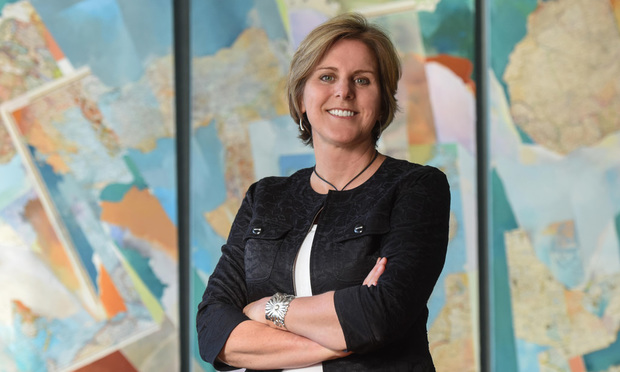A New Anti-Corruption Tool for In-House Counsel: Catalog of E-Government Services
After finding corruption was lower when handling certain matters online instead of face-to-face, TRACE launched the TRACE e-Gov Portal, which is the first comprehensive collection of over 15,000 links to e-government services in 90-plus countries.
April 16, 2019 at 05:39 PM
5 minute read
 Alexandra Wrage, president and founder of TRACE International.
Alexandra Wrage, president and founder of TRACE International.
A couple years ago when Gonzalo Guzman was working as an anti-corruption in-house counsel for GlaxoSmithKline, the company included in its compliance protocol that general managers in each country ask employees to use government services online if possible, rather than engage in person.
Employees and the British company loved the idea, Guzman recounted, because it meant fewer face-to-face meetings over visas, customs, taxes, licenses or other items where a government official could demand a bribe.
GlaxoSmithKline funded a study by the Basel Institute on Governance, at the University of Basel in Switzerland, which reported on a causal link between using e-government services and reducing corruption. Then Guzman mentioned the policy at a 2018 TRACE International conference, where in-house counsel are always looking for new ways to combat bribery.
“Something was still missing,” Guzman recalled. “There was no catalog or easy way to find e-government services across countries. Each employee just had to search for them every time.”
TRACE president Alexandra Wrage and her staff jumped on the idea of cataloging e-government services around the world.
Wrage said the project took over nine months to complete, with staffer Mike Juan in Manila working full time supported by other members in the Annapolis, Maryland, headquarters as needed.
“In a few cases—and Hong Kong stands out here—we reached out to the responsible party and they were extraordinarily helpful in directing us to all e-government options,” she said. “In most cases, however, it was a painstaking process of searching government websites, country-by-country and then government service-by-government service.”
Sometimes, she said, it took up to a week to finish a single country.
The result came in February when TRACE announced the launch of its new online tool: the TRACE e-Gov Portal. It is the first comprehensive collection of over 15,000 links to e-government services in 90-plus countries.
The site is divided into categories, such as procurement, customs, travel and such, and the design allows for the addition of new links as more countries come on board with digital services. “We're counting on the global business and compliance communities, as well as individual governments, to help us expand and maintain this public database,” Wrage said.
But one of the best features is that TRACE opened the site to the public, so any company, law firm or individual can use it.
Wrage, a frequent international traveler in her job, immediately saw the value. “Imagine arriving late at night in the largely closed airport of a challenging country and facing a single immigration officer,” she said.
Wrage continued, “You've been told that visas are available upon arrival, but the 'rules' have suddenly shifted and the officer starts referring to extra fees for late processing … [and] he's intimating he'll just go home.” With e-government, she said, “You can go online, typically just 24 hours before your arrival in a country, upload the requested information and the visa is delivered by email to be printed out, or even scanned at immigration upon arrival.”
Guzman, who eight months ago joined Netherlands-based Unilever as general counsel for anti-corruption and third-party compliance in Latin America, said he has begun introducing the policy there.
Maria Arbona, the Philadelphia-based manager of governance, external engagement, anti-bribery and corruption for GlaxoSmithKline, said she welcomed the portal. Arbona said the company is exploring how it can best “share this new resource with the business.”
She added, “I was encouraged to see the release of TRACE's e-Gov Portal and consider it a positive next step in using e-government solutions to reduce corruption.”
Another in-house counsel agreed. Jonathan Drimmer, deputy general counsel and chief compliance officer of Toronto-based Barrick Gold Corp., said he also is “trying to identify ways to integrate it into our compliance program. We haven't used it yet, but are in the process of figuring out how.”
Drimmer called the portal “a great initiative, and a concept for which I am highly supportive.”
As for Wrage, she knew she was on to something good “when I started hearing people praise traffic cameras. As vilified as those little devices are, in countries with high levels of police corruption, receiving and paying your ticket by mail is widely preferred to an awkward, possibly dangerous, exchange with a police officer on the side of a dark, isolated road.”
The portal hasn't gotten much press yet, Wrage said, because e-government isn't a very sexy topic. But after she wrote a short article for Forbes about the portal, Wrage said representatives of several countries called her to boast about their increased use of e-government.
She said Ukraine has estimated its e-procurement platform could save that country $1 billion per year.
“From our perspective, it's a chance to avoid a shakedown,” Wrage said. “From theirs, it's a chance to address the lost revenue associated with bribe-tainted contracts when shoddy goods sell at inflated prices.”
Her bottom-line: “Solutions that companies, governments and civil society can all get behind are worth a closer look.”
This content has been archived. It is available through our partners, LexisNexis® and Bloomberg Law.
To view this content, please continue to their sites.
Not a Lexis Subscriber?
Subscribe Now
Not a Bloomberg Law Subscriber?
Subscribe Now
NOT FOR REPRINT
© 2025 ALM Global, LLC, All Rights Reserved. Request academic re-use from www.copyright.com. All other uses, submit a request to [email protected]. For more information visit Asset & Logo Licensing.
You Might Like
View All
Chasing Goals Won't Give Frazzled In-House Lawyers Inner Peace, But a 'Mental Cleanse' Might

With 'Fractional' C-Suite Advisers, Midsize Firms Balance Expertise With Expense
4 minute read
Some Clients Are Pushing for Transparency Surrounding Origination Credits
5 minute read
The AI Revolution Is Here. Who Will Be the Winners and Losers in Legal Services?
10 minute readTrending Stories
- 1Uber Files RICO Suit Against Plaintiff-Side Firms Alleging Fraudulent Injury Claims
- 2The Law Firm Disrupted: Scrutinizing the Elephant More Than the Mouse
- 3Inherent Diminished Value Damages Unavailable to 3rd-Party Claimants, Court Says
- 4Pa. Defense Firm Sued by Client Over Ex-Eagles Player's $43.5M Med Mal Win
- 5Losses Mount at Morris Manning, but Departing Ex-Chair Stays Bullish About His Old Firm's Future
Who Got The Work
J. Brugh Lower of Gibbons has entered an appearance for industrial equipment supplier Devco Corporation in a pending trademark infringement lawsuit. The suit, accusing the defendant of selling knock-off Graco products, was filed Dec. 18 in New Jersey District Court by Rivkin Radler on behalf of Graco Inc. and Graco Minnesota. The case, assigned to U.S. District Judge Zahid N. Quraishi, is 3:24-cv-11294, Graco Inc. et al v. Devco Corporation.
Who Got The Work
Rebecca Maller-Stein and Kent A. Yalowitz of Arnold & Porter Kaye Scholer have entered their appearances for Hanaco Venture Capital and its executives, Lior Prosor and David Frankel, in a pending securities lawsuit. The action, filed on Dec. 24 in New York Southern District Court by Zell, Aron & Co. on behalf of Goldeneye Advisors, accuses the defendants of negligently and fraudulently managing the plaintiff's $1 million investment. The case, assigned to U.S. District Judge Vernon S. Broderick, is 1:24-cv-09918, Goldeneye Advisors, LLC v. Hanaco Venture Capital, Ltd. et al.
Who Got The Work
Attorneys from A&O Shearman has stepped in as defense counsel for Toronto-Dominion Bank and other defendants in a pending securities class action. The suit, filed Dec. 11 in New York Southern District Court by Bleichmar Fonti & Auld, accuses the defendants of concealing the bank's 'pervasive' deficiencies in regards to its compliance with the Bank Secrecy Act and the quality of its anti-money laundering controls. The case, assigned to U.S. District Judge Arun Subramanian, is 1:24-cv-09445, Gonzalez v. The Toronto-Dominion Bank et al.
Who Got The Work
Crown Castle International, a Pennsylvania company providing shared communications infrastructure, has turned to Luke D. Wolf of Gordon Rees Scully Mansukhani to fend off a pending breach-of-contract lawsuit. The court action, filed Nov. 25 in Michigan Eastern District Court by Hooper Hathaway PC on behalf of The Town Residences LLC, accuses Crown Castle of failing to transfer approximately $30,000 in utility payments from T-Mobile in breach of a roof-top lease and assignment agreement. The case, assigned to U.S. District Judge Susan K. Declercq, is 2:24-cv-13131, The Town Residences LLC v. T-Mobile US, Inc. et al.
Who Got The Work
Wilfred P. Coronato and Daniel M. Schwartz of McCarter & English have stepped in as defense counsel to Electrolux Home Products Inc. in a pending product liability lawsuit. The court action, filed Nov. 26 in New York Eastern District Court by Poulos Lopiccolo PC and Nagel Rice LLP on behalf of David Stern, alleges that the defendant's refrigerators’ drawers and shelving repeatedly break and fall apart within months after purchase. The case, assigned to U.S. District Judge Joan M. Azrack, is 2:24-cv-08204, Stern v. Electrolux Home Products, Inc.
Featured Firms
Law Offices of Gary Martin Hays & Associates, P.C.
(470) 294-1674
Law Offices of Mark E. Salomone
(857) 444-6468
Smith & Hassler
(713) 739-1250






